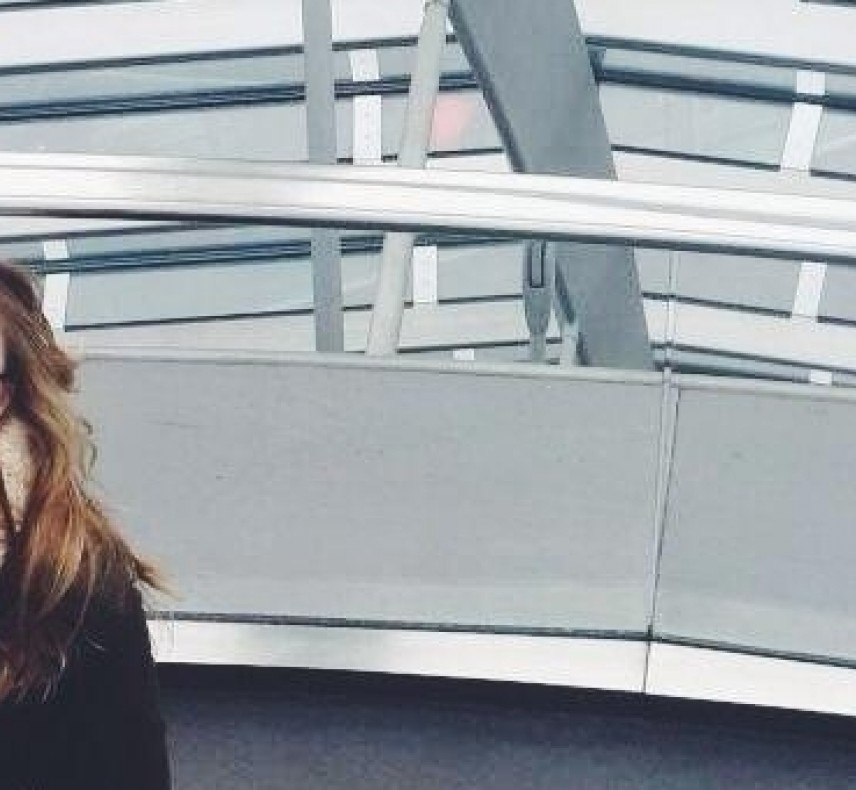Springfield, Ohio – They are just four inches square and often obscured by the dirt and dust of everyday life, but the “Stolpersteine” or stumbling blocks” implanted into the cities and towns of Germany serve a great purpose in life – a purpose that Wittenberg University student Melissa Newman wants to understand.
Newman, who graduated from Wittenberg on May 14, is a history major and German minor from New Lenox, Ill. She participated in one of the university’s signature international engagement offerings, the Wittenberg in Wittenberg, Germany Program, last spring semester and recently completed an additional internship with the United States Holocaust Museum in Washington, D.C.
A student in the honors program, she completed a project examining cultural memory and the public use of history of World War II in pubic exhibitions and museums in Germany before learning that she has been accepted as a Fulbright Student Award Winner to complete research in Munich beginning in September. Newman is one of more than 1,900 U.S. citizens who will travel abroad for the 2016-2017 academic year through the Fulbright U.S. Student Program.
Her research will focus on the controversy in Munich surrounding the placement of these “stumbling blocks.”
Stolpersteine are ‘tiny brass tablets of information’ across Germany and Europe exemplifying the targets of the Nazi Holocaust and they have become strong reminders that the victims were humans and not just statistics. Stolpersteine contains inscriptions placed in front of the homes of victims of Nazi terror and includes their name, date of birth, date of death and where they were imprisoned or lost their lives.
According to the website of the artist who initiated the project, Gunter Demnig, 55,000 Stolpersteine have been placed at 1,600 locations in 20 European countries, however, Munich does not permit them. Newman wants to change this.
“Munich does not allow Stolpersteine to be placed on public property, so it is my plan to go there and learn more about the decisions behind that and how these Stolpersteine contribute to a learning about and interacting with history apart from museums,” Newman said. “I’m really excited to go to Munich. It is a thriving and interesting city, and it will be so much fun to explore all that it has to offer over the course of 10 months.”
“I will be working with a professor at the Ludwig-Maximilians-Universität München, so I imagine I will be living on-campus or in the immediate vicinity, but that hasn’t been decided yet,” she added.
Newman will work with Professor Andreas Wirsching to study this controversy and its ramifications in understanding cultural memory.
She heard about the Fulbright opportunity through Wittenberg professors Tim Bennett, associate professor of languages and David Barry, associate professor of languages. Both professors, along with Mike Mattison, associate professor of English, were instrumental in helping her through the Fulbright process.
“Melissa’s genuine enthusiasm for intellectual endeavor and her willingness to challenge herself by studying different fields and by putting her education to the test outside the academy have contributed to her success,” Bennett said. “She has sought out every opportunity she could to enrich her education and deserves our support and our wishes for her continued growth and success.”
Recipients of Fulbright grants are selected on the basis of academic and professional achievement, as well as demonstrated leadership potential. The Fulbright Program is the flagship international educational exchange program sponsored by the U.S. government and is designed to increase mutual understanding between the people of the United States and the people of other countries.
“There is no interview process for Fulbright, so I had to write a one-page personal statement that really communicated my passions and personality into a three-dimensional human being,” Newman said. “Then I also needed to write a proposal of what I would actually be doing if I received the Fulbright grant. That involved a lot of research and thought - I knew I would be dedicated to this project in Germany for 10 months, so it better be something I am invested in. In addition to coming up with a proposed research project, I had to find someone in Germany that would supervise and host me. I certainly would not have been selected to be a Fulbright grantee had I not had the help from my incredible professors.”
Newman is passionate about the Holocaust and WWII history. She hopes to work at the same museum again.
“It was an absolutely fantastic experience,” Newman said of her internship at the museum in Washington, D.C. “It is my ambition to work there one day, so being able to work with the staff and get a feel of the museum for a summer was a dream come true. I was working in the Museum Services department, so I was interacting a lot with the visitors, answering their questions, explaining the different exhibits at the museum and helping them navigate the museum. I absolutely loved working there and hope to again someday.”
Newman will join more than 100,000 Fulbright U.S. Student Program alumni who have undertaken grants since the program began in 1948.







